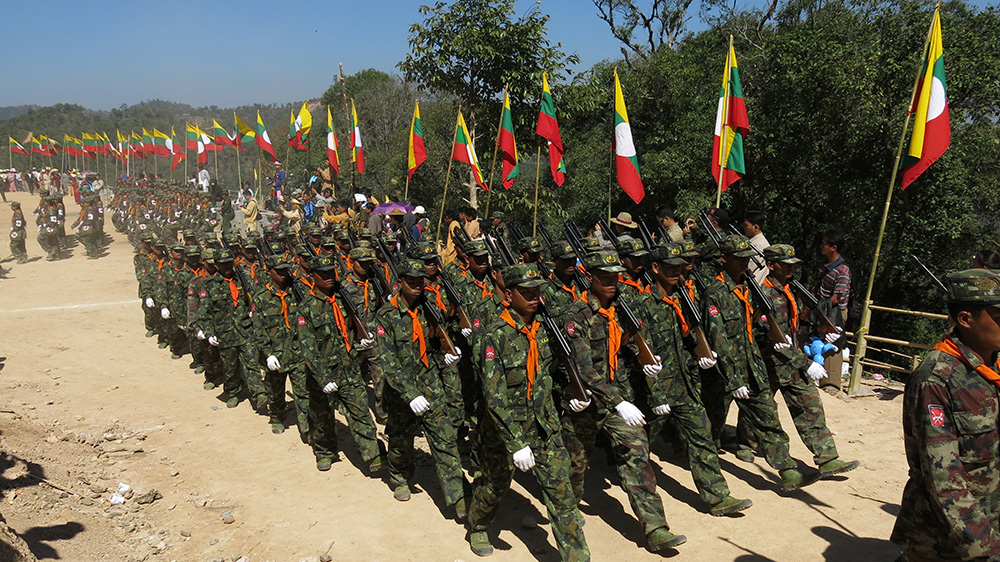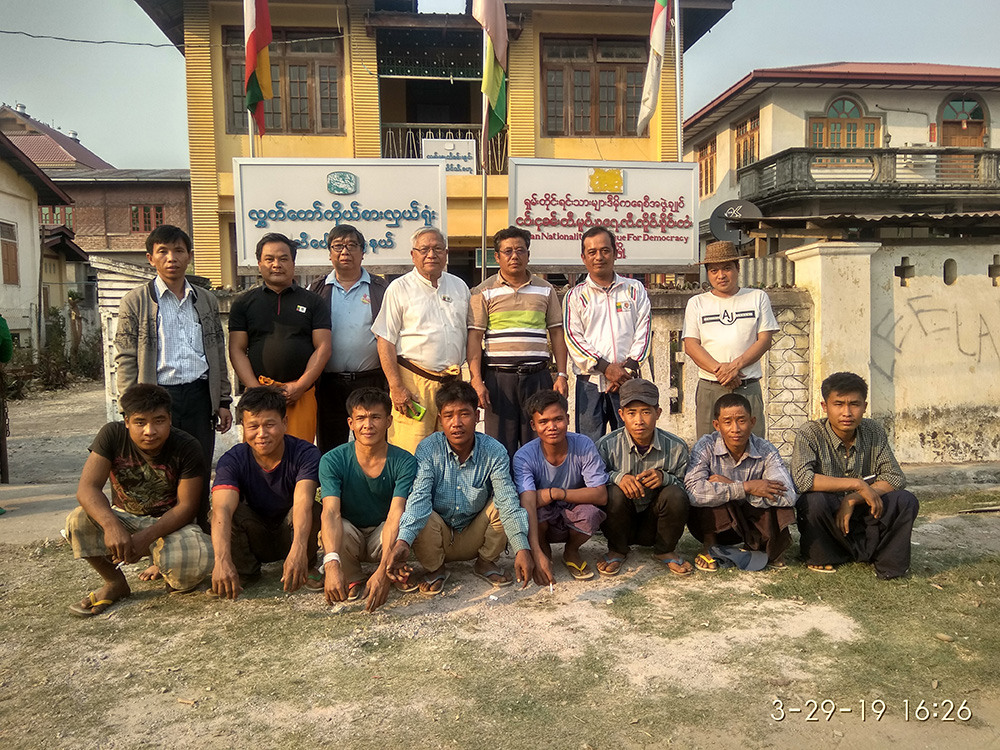NAMTU, Shan State – Villagers in Manli, which is beside the Hsipaw-Namtu Highway in Namtu Township in northern Shan State, do not like curious journalists, believing that talking to them will bring trouble.
Many of the villagers fled during fighting in early 2019. Since they came back they fear abduction by the Restoration Council of Shan State (RCSS).
When The Irrawaddy visited, some villagers prevented us from entering.
“You should go now because the two men there are guerrilla fighters. Our lives will be in danger if you continue to ask us questions. Please don’t exchange our lives for your news stories,” a villager told us.
The “guerrillas” were from the RCSS. But the Shan State Progressive Party (SSPP) is also active in the township. The SSPP wears green uniforms while the RCSS use camouflage fatigues.
The two young men on the other side of the road were watching intently, looking displeased.
One carried a long sword on his back so we left.
The villager added: “Don’t go to the village head’s house. When you leave they will go there and we will be in danger.”
After three days we returned and met the villagers.
We were told the resident who prevented us from entering the village had been seized by the RCSS in February and was released a month later.
The highway also sees activity by the Ta’ang National Liberation Army (TNLA) along with the SSPP and RCSS.
Another villager, Daw Aye Nway, lost her husband along with three of her neighbors. She was busy taking care of her 4-month-old baby in Manli.
In March, fighting broke out nearby and four villagers—including her husband—who stayed at the village head’s home to guard the village, went missing and have failed to return.
Daw Aye Nway and her neighbors believe the four men are being held by the RCSS.
“No matter which organization detained my husband, I want them to tell me if he is dead. If he is still alive, please release him. We face great troubles. It is very difficult to make a living,” she said.
Daw Aye Nway says she still expects the four villagers to return. The villagers say they are mostly ethnic Ta’ang so the RCSS, which fights against the TNLA, has racially fueled contempt for them.

The RCSS is known to have arrested eight other villagers during the fighting.
The group denied holding the 12 villagers but Ta’ang civil society groups obtained photographs of eight villagers being held by the RCSS.
The Ta’ang National Party, Ta’ang National Literature and Culture Committee and Shan Nationalities League for Democracy successfully secured their release using the photos as evidence.
Their return has increased fear in Manli as the eight described being beaten and tortured.
“We were not allowed to ask why we were detained. They were pointing their guns at us and said we would die if we tried to escape,” said U Aik Swe, one of the villagers released by the RCSS.
The RCSS told them they were suspected TNLA soldiers.
“They said we were Palaung [Ta’ang] soldiers and had been in the police. I said I was not a soldier but they put a hood on me, tied my hands and arrested me,” said U Aik Swe.
The villagers said they were taken to an RCSS camp in Hsipaw. They were fed every day but were not allowed to change their clothes. They were only allowed to wash twice during their almost monthlong detention.
They said the RCSS rolled a piece of wood on their shins and hit them with rifle butts, meaning they were only just able to walk again.
The Ta’ang in Namtu Township live in constant fear of the RCSS, according to U Aik Htike of the Ta’ang National Party.
“When the SSPP and the TNLA clashed in 2014, the SSPP treated us better. They asked us to collect rice and [extortion] money. We could ask them to forgive us if we could not meet their demands, as we had to work for both armed groups and we had difficulty recruiting and collecting taxes and rice for them. They forgave us.”
In late 2015, the RCSS entered the township and clashed with the TNLA, meaning the villagers had another group to fear, U Aik Htike said.
“The trouble grew when the armed groups from southern Shan State arrived in 2015-16. As Ta’ang, we are afraid of going to the areas where they operate and we live in fear,” he added.
Villagers say the RCSS regularly detain Ta’ang civilians, to interrogate them and beat them with rifle butts.
Many are still missing, he said.
U Aik Htike said there are over 30 Ta’ang civilians missing, including the four villagers from Manli.
The Ta’ang National Party and various Ta’ang organizations have accused the RCSS of abducting more than 30 civilians between 2016 and 2018.
In 2017, four Pan Hike villagers from Namtu Township disappeared but three escaped and returned to the village.
They said they were held by the RCSS.
In 2018, three Ta’ang men who went to Naung Ngin village in the township to sell bamboo shoots were reportedly seized by the RCSS.
U Aike Kon, 62, and U Aike Kha, 29, said they were tied up by their hands and necks while they were beaten and questioned about whether they were TNLA soldiers.

U Aike Kyar, 25, said he fainted while being repeatedly beaten with rifle butts and asked if he was a TNLA informer.
All three were released after two days.
Colonel Sai Ngin, a spokesman for the RCSS, rejected the Ta’ang accusations.
He said: “We have adopted a policy. Ethnic groups in that area and the Shan have many common characteristics. We have a tradition of living there through thick and thin, keeping the community intact. There is no problem between us.”
The RCSS had no policy of targeting Ta’ang civilians and abusing their rights, the colonel added. He said troops had orders to abide by international rules and not abuse civilians.
The RCSS is an ethnic armed organization that signed the Nationwide Ceasefire Agreement (NCA) in October 2015 and is taking part in the negotiations for the full rights of ethnic minority groups.
The NCA says signatories shall avoid activities that place a burden on the public, deploying troops near villages and bullying civilians.
Although the RCSS spokesman said his organization had never abused civilians, the released Ta’ang villagers and the Ta’ang community groups accuse the armed group of rights abuses.
Col. Sai Ngin said villagers from Manli were detained because they were caught in the crossfire and some were cooperating with both armed organizations.
“We arrested the eight villagers temporarily for their safety and convenience during the fighting. We treated them well at our camp and never abused their human rights,” he said.
U Mai Nge Lay of the Ta’ang National Party and a Ta’ang community leader is one of the eight villagers who were released by the RCSS.
He said: “The group that detained us during the fighting was very aggressive. We felt we were arrested because there were different people with contrasting attitudes.”
U Mai Nge Lay said they still did not feel safe in their village.
The RCSS said only eight Manli villagers were taken and the group had nothing to do with the four other missing people.
There was photographic evidence of the eight freed villagers but nothing of the missing four villagers.
“I want him to come back,” Daw Aye Nway said in tears.
The villagers all said they were worried about their safety after talking to the media.
The TNLA and SSPP have also abducted civilians, forced them to recruit troops and asked them to work as informers or to collect money and food in Namtu, villagers told The Irrawaddy during visits in January and July this year.
Between 2016 and 2019, about 60 Shan civilians were reportedly killed or tortured by the TNLA on suspicion of working for the RCSS.
Translated by Myint Win Thein

















